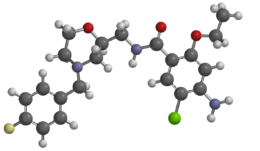 | |
 | |
| Clinical data | |
|---|---|
| AHFS/Drugs.com | International Drug Names |
| ATC code | |
| Identifiers | |
| |
| CAS Number | |
| PubChem CID | |
| IUPHAR/BPS | |
| DrugBank | |
| ChemSpider | |
| UNII | |
| KEGG | |
| ChEBI | |
| ChEMBL | |
| CompTox Dashboard (EPA) | |
| ECHA InfoCard | 100.127.999 |
| Chemical and physical data | |
| Formula | C21H25ClFN3O3 |
| Molar mass | 421.90 g·mol−1 |
| 3D model (JSmol) | |
| |
| |
| | |
Mosapride is a gastroprokinetic agent that acts as a selective 5HT4 agonist. The major active metabolite of mosapride, known as M1, additionally acts as a 5HT3 antagonist,[1] which accelerates gastric emptying throughout the whole of the gastrointestinal tract in humans,[2] and is used for the treatment of gastritis, gastroesophageal reflux disease, functional dyspepsia[3] and irritable bowel syndrome.[4] It is recommended to be taken on an empty stomach (i.e. at least one hour before food or two hours after food).[5]
In addition to its prokinetic properties, mosapride also exerts anti-inflammatory effects on the gastrointestinal tract which may contribute to some of its therapeutic effects.[6] Mosapride also promotes neurogenesis in the gastrointestinal tract which may prove useful in certain bowel disorders.[7][8] The neurogenesis is due to mosapride's effect on the 5-HT4 receptor where it acts as an agonist.[9]
Its common side effects include dry mouth, abdominal pain, dizziness, headache, insomnia, malaise, nausea, diarrhea and sometimes constipation.[3][10] Unlike some other prokinetic agents, mosapride has little effect on potassium channels, no effect on hERG transfected cells, and no effect on cardiovascular function that could be detected in tests on humans.[1][11] Due to the pharmacokinetics of mosapride, it would take 1,000–3,000 times the therapeutic dose to elicit cardiovascular effects.[12]
- ^ a b Tack J, Camilleri M, Chang L, Chey WD, Galligan JJ, Lacy BE, et al. (April 2012). "Systematic review: cardiovascular safety profile of 5-HT(4) agonists developed for gastrointestinal disorders". Alimentary Pharmacology & Therapeutics. 35 (7): 745–67. doi:10.1111/j.1365-2036.2012.05011.x. PMC 3491670. PMID 22356640.
- ^ Odaka T, Suzuki T, Seza A, Yamaguchi T, Saisho H (August 2006). "[Serotonin 5- HT4 receptor agonist (mosapride citrate)]". Nihon Rinsho. Japanese Journal of Clinical Medicine (in Japanese). 64 (8): 1491–4. PMID 16898619.
- ^ a b Curran MP, Robinson DM (2008). "Mosapride in gastrointestinal disorders". Drugs. 68 (7): 981–91. doi:10.2165/00003495-200868070-00007. PMID 18457463. S2CID 195686202.
- ^ Mizuta Y, Shikuwa S, Isomoto H, Mishima R, Akazawa Y, Masuda J, et al. (November 2006). "Recent insights into digestive motility in functional dyspepsia". Journal of Gastroenterology. 41 (11): 1025–40. doi:10.1007/s00535-006-1966-z. PMID 17160514. S2CID 13353302.
- ^ Kato S, Morie T, Yoshida N (April 1995). "Synthesis and biological activities of metabolites of mosapride, a new gastroprokinetic agent". Chemical & Pharmaceutical Bulletin. 43 (4): 699–702. doi:10.1248/cpb.43.699. PMID 7600620.
- ^ Tsuchida Y, Hatao F, Fujisawa M, Murata T, Kaminishi M, Seto Y, et al. (May 2011). "Neuronal stimulation with 5-hydroxytryptamine 4 receptor induces anti-inflammatory actions via α7nACh receptors on muscularis macrophages associated with postoperative ileus". Gut. 60 (5): 638–47. doi:10.1136/gut.2010.227546. PMC 3071096. PMID 21115544.
- ^ Kawahara I, Kuniyasu H, Matsuyoshi H, Goto K, Obata K, Misawa H, et al. (March 2012). "Comparison of effects of a selective 5-HT reuptake inhibitor versus a 5-HT4 receptor agonist on in vivo neurogenesis at the rectal anastomosis in rats". American Journal of Physiology. Gastrointestinal and Liver Physiology. 302 (6): G588-97. doi:10.1152/ajpgi.00284.2011. hdl:10564/2701. PMID 22194416.
- ^ Matsuyoshi H, Kuniyasu H, Okumura M, Misawa H, Katsui R, Zhang GX, et al. (July 2010). "A 5-HT(4)-receptor activation-induced neural plasticity enhances in vivo reconstructs of enteric nerve circuit insult". Neurogastroenterology and Motility. 22 (7): 806–13, e226. doi:10.1111/j.1365-2982.2010.01474.x. PMID 20146727. S2CID 36819102.
- ^ Goto K, Kato G, Kawahara I, Luo Y, Obata K, Misawa H, et al. (2013). "In vivo imaging of enteric neurogenesis in the deep tissue of mouse small intestine". PLOS ONE. 8 (1): e54814. Bibcode:2013PLoSO...854814G. doi:10.1371/journal.pone.0054814. PMC 3561410. PMID 23382976.
- ^ Mosapride drug information – Drugs Update India
- ^ Kii Y, Ito T (May 1997). "Effects of 5-HT4-receptor agonists, cisapride, mosapride citrate, and zacopride, on cardiac action potentials in guinea pig isolated papillary muscles". Journal of Cardiovascular Pharmacology. 29 (5): 670–5. doi:10.1097/00005344-199705000-00016. PMID 9213211.
- ^ Kii Y, Ito T (May 2002). "Drug-induced ventricular tachyarrhythmia in isolated rabbit hearts with atrioventricular block". Pharmacology & Toxicology. 90 (5): 246–53. doi:10.1034/j.1600-0773.2002.900504.x. PMID 12076305.